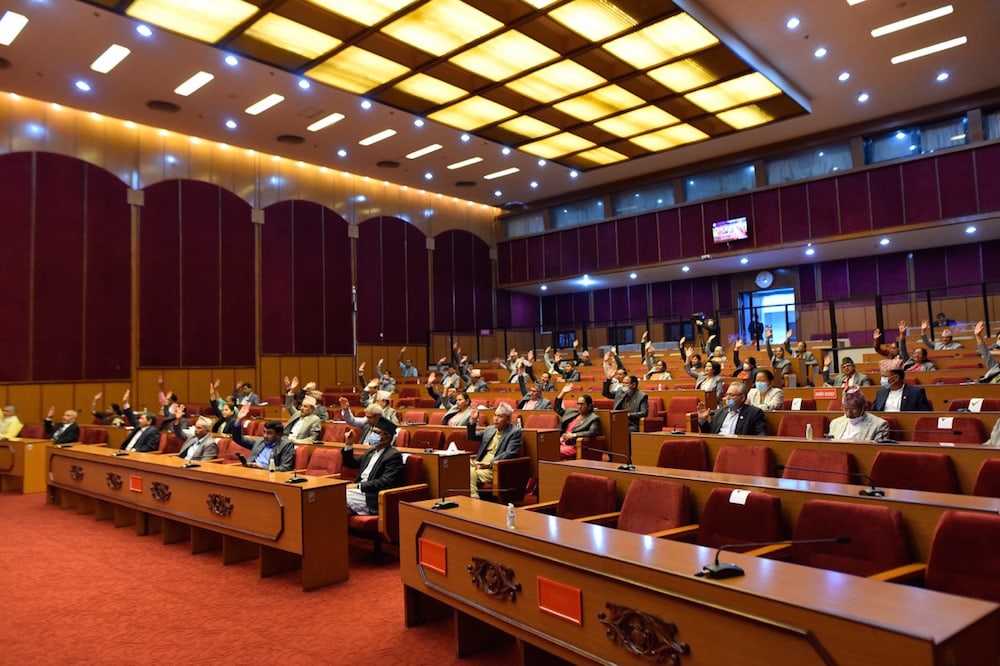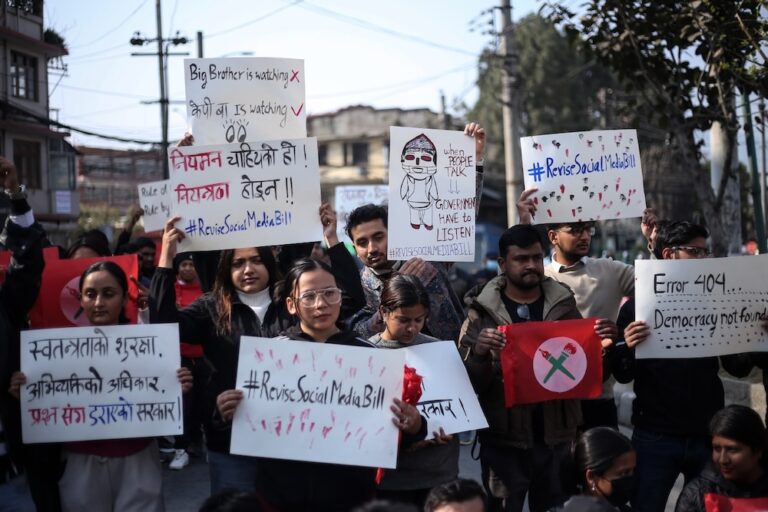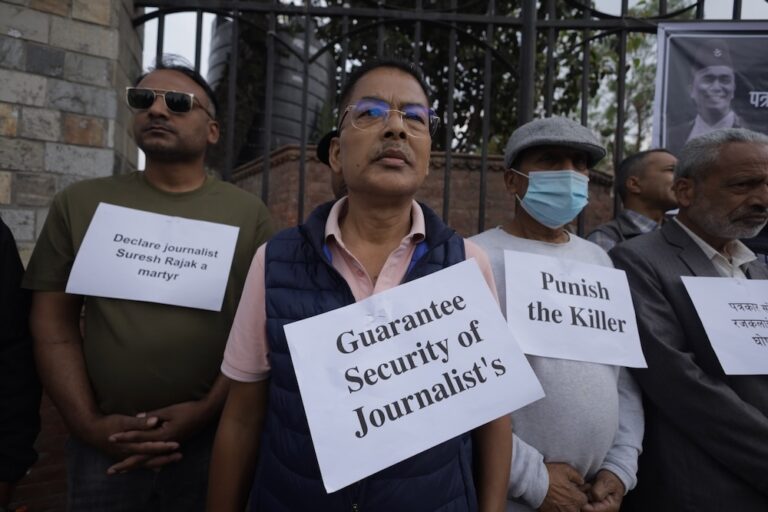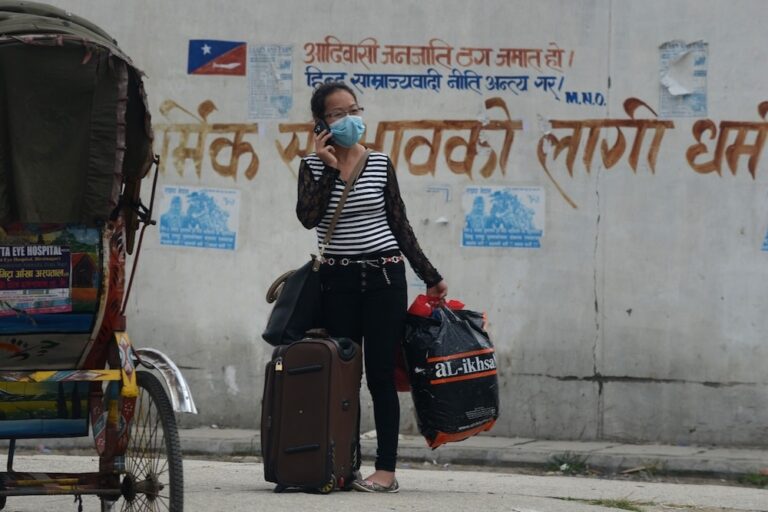The Universal Periodic Review (UPR) report on freedom of expression and civic space was submitted by Freedom Forum and Free Press Unlimited in the thirty-seventh Session of the Working Group on the UPR.
This statement was originally published on freedomforum.org.np on 12 January 2021.
Freedom Forum’s advocacy on freedom of expression(FoE) and unobstructed civic space has not only been carried out within within the country, but has also reached the level of international human rights platforms such as the United Nations that help exert moral pressure on the State to respect, protect and promote FoE and civic space in Nepal.
This is the third time that FF has submitted a Universal Periodic Review (UPR) report on freedom of expression, and the first UPR on civic space. Under the free expression report, the themes were FoE, access to information and journalists’ safety. The UPR report was submitted jointly by FF and the Netherlands-based organization Free Press Unlimited (FPU) in the thirty-seventh Session of the UPR Working Group.
The UPR report pointed out some substantive improvements in the modern history of Nepal, such as the new constitution and the new form of governance, and with regards to Article 19 of the Universal Declaration of Human Rights and Article 19 of the International Covenant of Civil and Political Rights. At the same time the report expressed concern over the deteriorating environment for the media, and the alarming situation concerning the working environment and journalists’ safety; the failure of the State to make amendments in the constitution to comply with international standards of Freedom of Expression and Access to Information; continued efforts by the government and political actors at different levels of government to suppress citizens and journalists through the misuse of the Electronic Transaction Act; and the shrinking online space for Freedom of Expression and Access to Information. These were were grave concerns that point to a deteriorating environment for media.
Similarly, an increase in harassment by the government and political actors at different levels of government of journalists and other people exercising their right to freedom of expression, including artists; failure by the government to guarantee the effectiveness of the transitional justice mechanisms, being the Truth and Reconciliation Commission (TRC) and the Commission of Investigation on Enforced Disappeared Persons (CIEDP) and a lacking government response to end impunity relating to crimes against journalists; failure of the government to acknowledge the right to access to information and journalists’ safety in regards to sustainable development goal SDG 16.10; an increase in (self) censorship and online harassment of journalists – these were some of the indicators pointing to an alarming situation concerning the working environment and safety of journalists.
Some of the recommendations made in the joint UPR submission are:
• Ensure legal reform with amendments in the Constitution of Nepal and other laws in line with international principles of Freedom of Expression and in accordance with international human rights law and standards, by redefining or deleting lengthy, vague and unnecessary provisions in the Constitution, specifically Articles 17 Clause (1 and 4); Article 19 (proviso); Article 27; RTI Act: Section 3; Mass Communication Policy: Section 3.7.2; Criminal Code: Section 305-307, Section 121; Civil Code: Section 21 (d); IT Bill: Section 86, 88; Media Council Bill: Section 5 and 7; Nepal Special Service Bill: Section 10 (1,2,3 and 5); Advertisement Act: Section 5 (1), Section 8 and 15
• Clearly define the provisions within the Electronic Transaction Act or its replacement IT Bill in accordance with international human rights law and standards
• Establish a separate multi-stakeholder digital authority that undertakes interdisciplinary research and study according to criteria agreed through public consultation on broader issues of internet freedoms, including Freedom of Expression online, and that furnishes suggestions to the government and the public on themes such as misinformation and fake news with the aim to increase media literacy
• Intensify the process to implement the directive brought at the National Human Rights Commission (NHRC) in order for the protection of human rights of journalists and rights defenders. The mechanism on the safety of Freedom of Expression defenders, including journalists, should ensure representation of Freedom of Expression experts, security personnel, concerned Ministry representatives and NHRC officials
• Actively enhance and build capacity of the transitional justice mechanisms (TRC and CIEDP) with sufficient human and financial resources and legal and political support
• Amending the legal framework of the TRC and CIEDP to make it consistent with international human rights law and Supreme Court of Nepal rulings
• Set a baseline, indicators and targets by developing a monitoring mechanism to monitor government actions contributing to SDG indicators 16. 10 1. and 16.10.2 and set up a multi-stakeholder body assigned to critically assess government actions towards this end
• Ensure stakeholder participation in media policy development and law making that contribute to SDG goal 16.10
• Amend the RTI Act to ensure the Right to Information for all people by broadening its scope beyond citizens
• Devise an institutional and legal mechanism at the provincial and local governments to implement the right to information
• Ensure information sharing/disclosure in an open data format
• The government of Nepal should transform the government-owned media to a public service media, while ensuring editorial independence
• Adopt comprehensive national legislation in order to ensure media pluralism and protect independent media
• Investigate and stop state-sponsored trolling and cyber-bullying against journalists and dissenting voices



